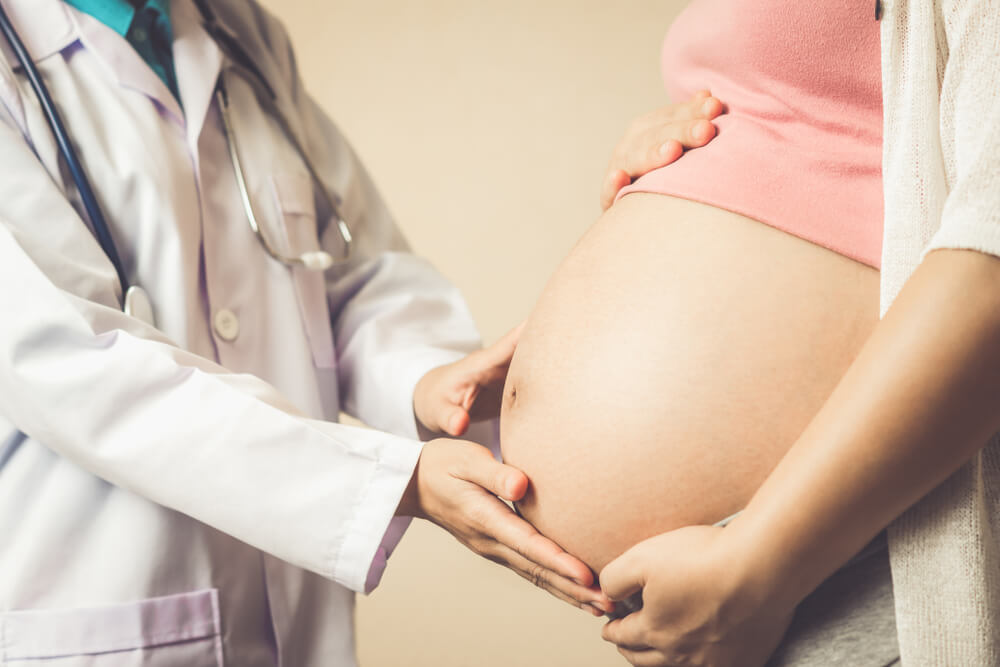Giving birth to a human is a beautiful and magical experience, but it has many physical and psychological changes. You may like some of those and be uncomfortable with others. Many women report mood swings, weight gain, morning sickness, stretch marks, and many other symptoms in the gestational period. Therefore, you will need a lot of support from your loved ones and a trusted healthcare provider to help you carry your child with minimal complications.
We urge you to get in touch with our caring obstetrician in Sarasota, FL, who will take care of you during your pregnancy. Our experienced staff at University Park OBGYN will provide you with the most up-to-date medical care for all phases of that magical period.

Stages of Pregnancy
As you may know, there are three stages of the gestational period, and each of them comes with new pregnancy changes. There are some that will stay throughout all of the trimesters and some that will pass after a while. Here’s what you can expect in each of them.
The first trimester of child-bearing can be overwhelming for women, especially those who have never given birth in the past. There will be a lot of invisible but significant signs. You will probably notice the missed period first, followed by a couple of other pregnancy effects, including:
- Morning sickness (nausea and vomiting) – It can happen any time of the day and usually begins a few weeks after you conceive. This happens because of the hormones and affects the majority of pregnant people. Avoid having an empty stomach to relieve nausea by eating small meals every two hours. It is important to stay hydrated too.
- Swollen, tender breasts – Hormonal fluctuations will probably make your breasts painful and sensitive to the touch. After the body adjusts to the increased estrogen levels, the discomfort will slowly fade.
- Food cravings – When pregnant, women become sensitive to certain smells, and their senses of taste alter as well.
- Heartburn – Indigestion is common in pregnancy and is also caused by elevated hormonal levels. Acidic content inside your stomach moves up to the esophagus, causing heartburn. You can ease it by eating small meals often and avoiding spicy foods.
- Frequent urination – You might notice the need to go to the bathroom repeatedly. That happens because the amount of blood during the gestational period increases, so your kidneys work harder to process additional fluid that goes to your bladder.
- Constipation – Increased levels of progesterone can sometimes slow the motion of food in your intestines, causing constipation. Additionally, some prenatal supplements have high amounts of iron, which can also add to the issue. If you want to relieve or prevent this condition, make sure to drink plenty of fluids and eat foods rich in fiber. Staying active helps a lot too.
- Fatigue – You may feel lethargic during early pregnancy. Resting as much as possible benefits both you and your baby.
Many women find the second trimester of the gestational period the most enjoyable. Morning sickness passes, and the baby inside your stomach isn’t big enough to cause any pain or discomfort. You may start to notice that your body changes during pregnancy, and these transformations will finally be visible. During the second trimester, women can expect the following:
- Bigger stomach – As your uterus grows to support the baby, your tummy also does. You will notice your belly getting bigger every week.
- Dental issues – Unfortunately, many pregnant people report increased gum sensitivity during the second trimester. Your hormones increase, so your body makes more blood, causing bleeding gums. Try switching to a brush with softer bristles and rinsing your mouth with salt water to decrease discomfort. If you had an issue with vomiting during early pregnancy, take additional care of your teeth.
- Braxton Hicks contractions – A woman’s body goes through a lot during pregnancy, including mild contractions that can be mistaken for true labor contractions. They are irregular and usually occur after physical activity or sexual intercourse. If these become more frequent or uncomfortable, make sure to contact your doctor, as they can push you to go into labor earlier.
- Bigger breasts – That’s when many women report bigger and firmer breasts. You can try wearing a supportive bra to ease any discomfort.
- Skin changes – Increased hormonal levels can stimulate pigment-bearing cells (melanin) in the skin, ending in brown patches on the face or a dark line on the abdomen. Fortunately, these skin transformations usually fade after delivery. Make sure to wear sun protection when you’re outdoors.
- Leg cramps – These are extremely common during the second trimester and even later on. They get worse during the night. You can prevent them by stretching your leg muscles before sleeping and by staying active. Make sure to buy comfortable shoes. A hot, steamy shower followed by a massage can also relieve pain.
- Vaginal discharge – If you notice a sticky, white, or clear discharge, do not panic. It is a normal occurrence. However, contact your gynecologist if you detect an unpleasant odor and a different color of discharge or if you have any pain or itching in the vaginal area. Those symptoms usually indicate an infection.
- Urinary infections – Increased levels of hormones cause changes in the urinary tract, resulting in recurring infections of the urinary tract (UTI). Symptoms include a strong need to urinate, sharp pain while doing it, cloudy and smelly urine, and in some cases, fever. Contact your healthcare provider as soon as you notice the first symptoms of a UTI.

As for the third trimester, many women describe it as tiring and emotionally challenging. You might have trouble moving, doing everyday tasks, or even sitting in certain positions. If you are tired of being pregnant and want to become a parent, you are not alone. It is important to stay positive as you will soon hold the baby in your arms. Pregnancy changes your body the most during this period. Here is what you can anticipate during the third trimester:
- Backaches – Elevated levels of hormones in your body relax the connective tissue that holds your bones, especially in the pelvic region. That results in pain in your lower back and spine. Make sure to sit on chairs with good support and exercise regularly. Yoga for pregnant women can be highly beneficial to those with backaches.
- Heartburn – Just like in the first trimester, gestational hormones relax the valve between your esophagus and stomach, ending in acid reflux.
- Spider and varicose veins, hemorrhoids – When your hormones change, your body produces and contains larger quantities of blood. Therefore, increased blood circulation can cause small reddish veins called spider veins on your legs, neck, arms, and face. These usually fade after delivery. Some women also get varicose veins on their legs. If you suffer from constipation, itchy veins called hemorrhoids may show up in the rectal region. To alleviate pain and discomfort, lift your legs up when resting and include plenty of fiber and liquids in your diet. As for hemorrhoids, soaking in a sitz bath and showering after defecating can help.
- Frequent urination – Since your baby moves deeper into the pelvis, you will feel additional pressure on your bladder, and you will probably need to urinate more often. Sometimes, women experience bladder leakage, especially when they sneeze, laugh, or lift. Try using pads in those cases.
Your doctor will help you manage all of these pregnancy effects if you are having trouble doing it on your own. Women often aren’t able to do their daily tasks due to morning sickness, breathing difficulties, and overall pain.
Summary
Pregnancy changes the body in the most unbelievable and beautiful ways, but there are some symptoms you might find unbearable. As the due date approaches, keep an eye on all of them and stay informed. Your trusted healthcare provider can help you by answering all the questions you might have and by letting you know what you can expect in which trimester. As your body changes during pregnancy, it is essential to be alert to any new or unexpected symptoms. Please contact us at University Park OBGYN and schedule an examination with our skilled staff.


